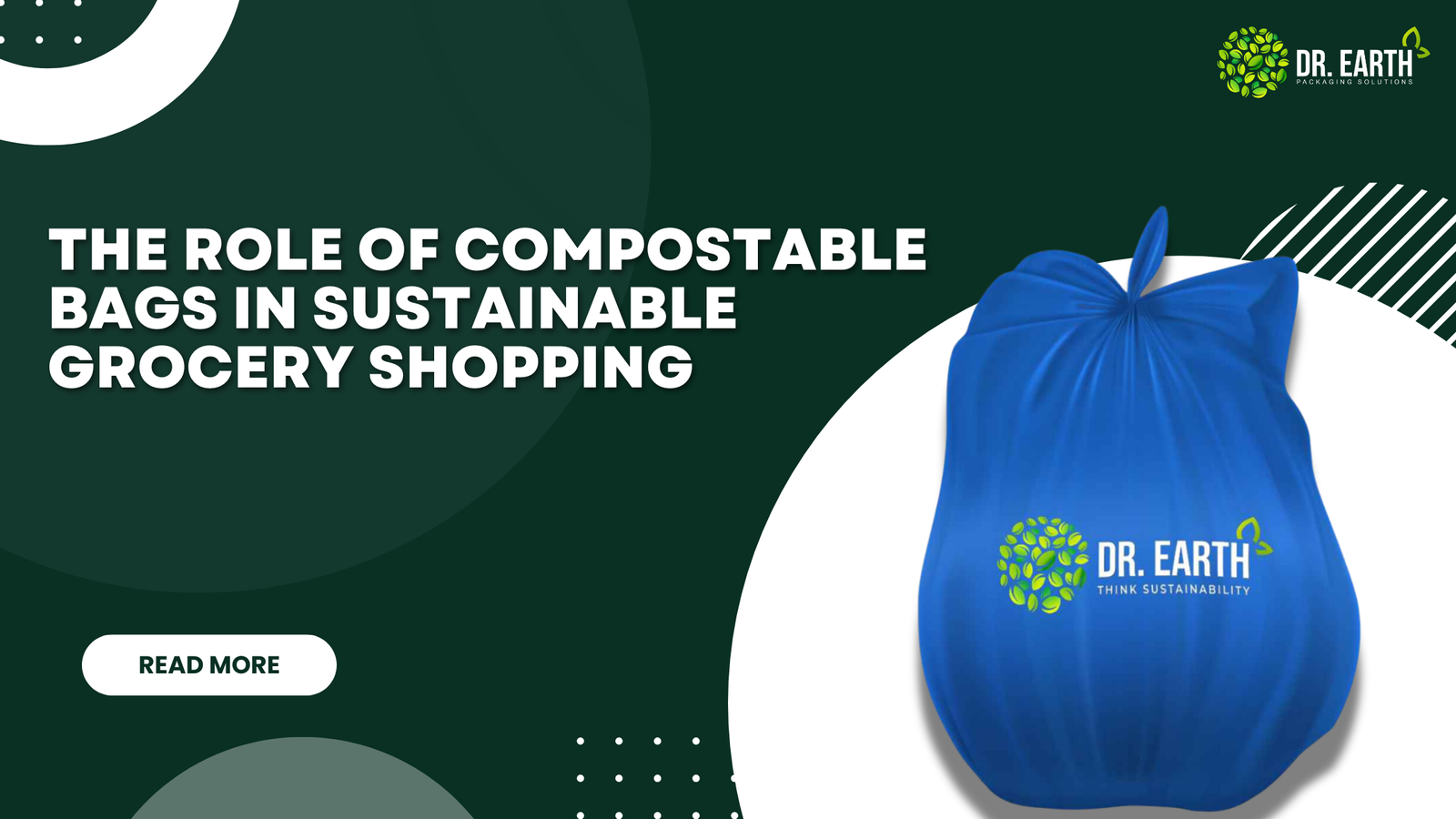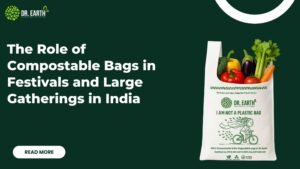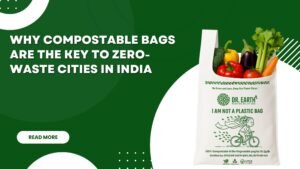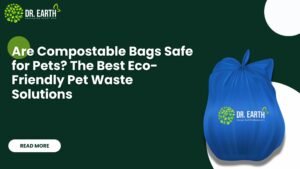
Sustainability is now the cornerstone of modern living since people, companies, and governments are trying to counteract climate change and diminish environmental damage. Among the lifestyle changes that are required for a greener future, grocery shopping is one of the most important places where change can be really made. Compostable bags, especially those designed by Dr. Earth, have become a strong answer for sustainable shopping and reduced reliance on harmful plastics.
This is a comprehensive guide to the importance of compostable bags in the grocery shopping revolution, which talks about their benefits, challenges, and role in bringing forth a plastic-free future.
The Problem: Plastic Pollution and Its Impact on Grocery Shopping
Plastic: A Persistent Problem
Once touted as a convenient item, plastic bags have become perhaps one of the biggest contributors toward environmental degradation. It is believed that 500 billion to 1 trillion plastic bags are consumed every year in the world, and so little of them is recycled. The rest would be thrown into landfills or into oceans and natural ecosystems, where they persist for more than a century.
Key issues caused by plastic bags include:
- Landfill Overflow: Plastic bags take up much space in landfills and even release toxins as they slowly decompose.
- Injury to Wildlife: Marine and terrestrial animals tend to eat or get caught up in plastic waste, which results in injury or death.
- Microplastic Pollution: Plastics break down into microplastics, which pollute soil, water, and the food chain.
Plastic Use in Grocery Shopping
From produce bags to checkout sacks, plastic is omnipresent in grocery shopping. Single-use plastic has long been the unsustainable basis on which the food retail industry needs alternatives such as compostable bags.
Compostable Bags: A Game-Changer in Grocery Shopping
Compostable bags are an eco-friendly substitute for plastic bags. They provide all the convenience of plastic without the cost to the environment. They are designed to break down naturally in composting environments and leave no toxic residues.
How Compostable Bags Work
The material is extracted from plant-based elements, which might include corn starch, potato starch, or other natural fibers. If appropriately exposed to the correct parameters of heat, moisture, and microbial activity, within weeks or months, such bags decompose into water, carbon dioxide, and organic matter.
Key Features of Compostable Bags
- Environment-friendly-compostable
- Nontoxic—leaves no hazardous chemical behind without microplastics.
- Supportable aid in the production of nutrient-rich compost for farmlands.
- Made from sustainable resources: use plant-based rather than fossil-fuel sources.
Benefits of Compostable Bags in Sustainable Grocery Shopping
1. Drastically Reduces Plastic Waste
Compostable bags greatly decrease the amount of plastic waste produced because of grocery shopping. Instead of plastic, these bags biodegrade quickly and do not stay around long enough to pollute for decades.
2. Promotes a Circular Economy
Compostable bags encourage the closed-loop system, meaning that waste turns into a source. When thrown away, they degrade into organic compost that may help improve agricultural soil and decrease reliance on chemical fertilizers.
3. Supports Climate Action
Compostable bag manufacturing emits fewer greenhouse gases than plastic bags, leaving a smaller carbon footprint of the process. They decompose in a manner that relates to natural cycles as opposed to plastic, which releases unhealthy gases such as methane when it is landfilled.
4. Safe for Food Contact
The compostable bags by Dr. Earth are food-safe, appropriate for grocery shopping and carrying fresh produce, meats, and dairy products safely.
5. Encourages Responsible Consumer Behavior
Using compostable bags promotes eco-friendly practices and encourages people to change their single-use plastic dependence. Every purchase is a commitment to sustainability, creating ripples across communities.
Dr. Earth: Pioneering Compostable Bags
Dr. Earth has emerged as a major biodegradable and compostable bag manufacturer, producing products that comply with the global environmental standard. The company produces long-lasting and multi-purpose bags using natural, renewable resources in a mission to fight plastic pollution.
What Makes Dr. Earth Unique?
What Sets Dr. Earth Apart?
- Certified Sustainability:
The bags produced by Dr. Earth are certified by the CPCB, CIPET, and CTO, ensuring that the products meet rigorous environmental standards.
- High-Quality Materials:
These bags are made from corn starch, potato starch, and other plant-based material, which ensures 100% compostability.
- Versatile Design:
Be it grocery shopping or using them as waste bags, Dr. Earth’s compostable bags are strong and versatile.
- Commitment to a Plastic-Free Future:
Dr. Earth is working toward reducing plastic pollution globally by promoting a sustainable lifestyle.
Compostable Bags vs. Plastic and Biodegradable Bags
Many have confused compostable with biodegradable or plastic alternatives. Here are the differences:
| Feature | Plastic Bags | Biodegradable Bags | Compostable Bags |
| Material | Petroleum-based | Petroleum or plant-based | Plant-based (corn, potato) |
| Decomposition Time | Hundreds of years | Varies, often years | 90-180 days |
| Residues | Toxic microplastics | May leave residues | Nutrient-rich compost |
| Environmental Impact | Severe | Moderate | Minimal |
Compostable bags have emerged as the clear winner on sustainability, making them a must for eco-friendly grocery shopping.
Practical Tips for Using Compostable Bags in Grocery Shopping
1. Carry Bags for Every Grocery Trip
Carry a few compostable bags in your car or bag so you never have to turn to plastic when you need to do an impromptu shopping.
2. Reuse Before Composting
Maximize the utility of your compostable bags by reusing them for grocery or household duties before disposing of them in a composting environment.
3. Educate Yourself and Others
Learn about proper disposal of compostable bags and make others aware of it also.
4. Dispose Properly
Ensure that your compostable bags break down properly; dispose of them in an industrial composting facility or an adequately maintained home compost bin.
Challenges in Adopting Compostable Bags
While compostable bags are a promising alternative, some barriers must be addressed to ensure their widespread adoption:
1. Cost Concerns
Compostable bags are usually more expensive than plastic alternatives. However, as demand increases and production scales up, costs are expected to decrease.
2. Limited Awareness
Many people are still unaware of the benefits of compostable bags. Public education and targeted marketing campaigns are necessary to bridge this gap.
3. Infrastructure for Composting
Proper facilities are required for effective composting. Increasing access to composting infrastructure is important to unlock the full potential of compostable bags.
4. Misuse and Mislabeling
Compostable bags will be sent to the trash or recycling bin, as consumers will not know how to dispose of them properly, where they will not decompose. Clear labeling and instructions are important.
The Role of Businesses in Promoting Compostable Bags
Grocery stores and retailers are significant drivers in adoption and support the use of compostable bags. Carrying and promoting compostable opportunities can
- They demonstrate commitment to sustainability.
- Educate customers on green practices.
- decrease their overall footprint on the environment.
Compostable bags that are produced by Dr. Earth, which team up with businesses to supply superior-quality compostable bags, thereby enabling retailers to meet their sustainability goals and offer customers a better shopping experience.
Conclusion: A Greener Future with Compostable Bags
Compostable bags are far beyond an alternative to plastic. They form a key step toward the future with a sustainable way of living. Incorporation of such bags into routine grocery shopping may make a considerable difference in saving the environment while promoting responsible consumerism and paving the way to a plastic-free world.
Dr. Earth leads this movement by offering high-quality, certified compostable bags that cater to diverse needs without compromising the planet’s health. Make the switch today and become part of the solution to one of the most pressing environmental challenges of our time.
FAQs
Q1. How are compostable bags different from biodegradable bags?
Ans- Compostable bags break down completely and feed the soil, while biodegradable bags leave residues or take years to degrade.
Q2. Can I compost Dr. Earth’s bags at home?
Ans- Yes, but your home compost bin needs to be hot, wet, and have microbes in order to break it down.
Q3. Are compostable bags strong enough for groceries?
Ans- Absolutely! Dr. Earth’s compostable bags can carry heavy grocery loads without tearing.
Q4. How long do compostable bags take to break down?
Ans- Within 90-180 days, they decompose when composting conditions are correct.
Q5. Where can I buy Dr. Earth’s compostable bags?
Ans- Explore the product range by visiting Dr. Earth’s website for the eco-friendly products.
Share:
Related Posts














